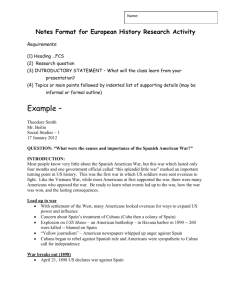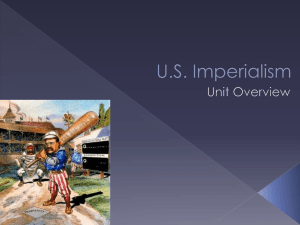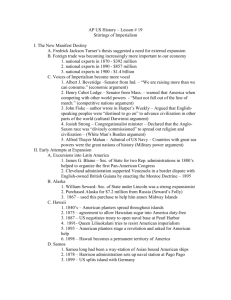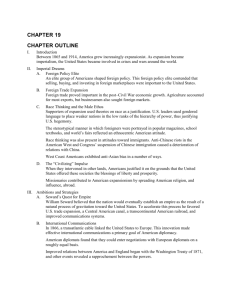Imperialism Notes
advertisement
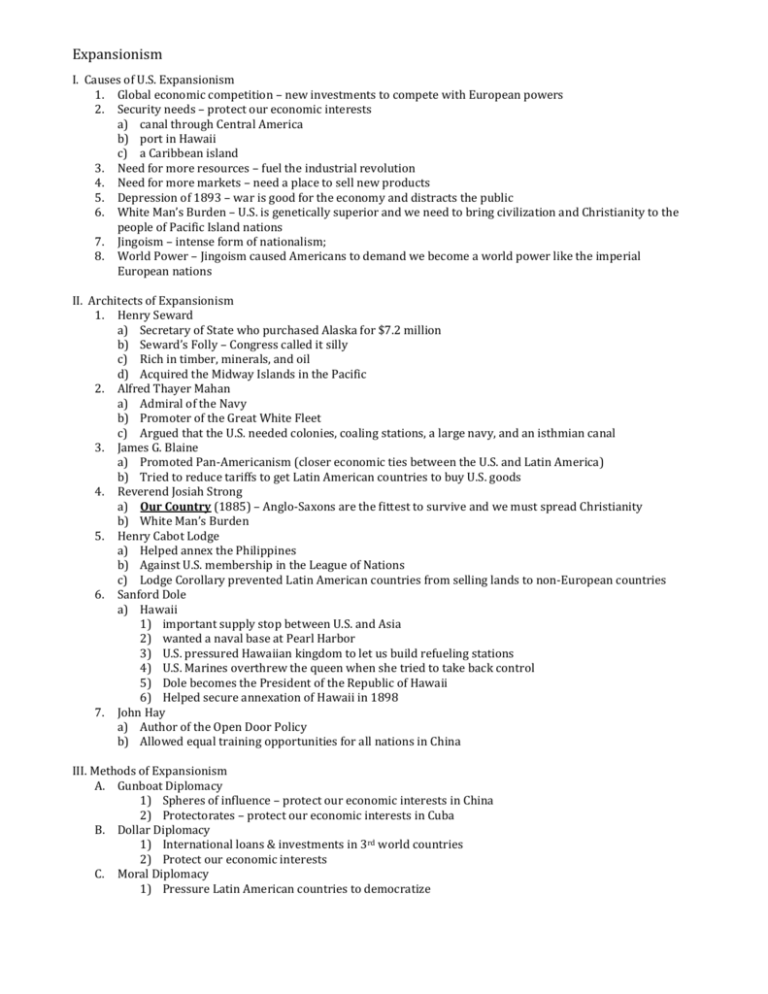
Expansionism I. Causes of U.S. Expansionism 1. Global economic competition – new investments to compete with European powers 2. Security needs – protect our economic interests a) canal through Central America b) port in Hawaii c) a Caribbean island 3. Need for more resources – fuel the industrial revolution 4. Need for more markets – need a place to sell new products 5. Depression of 1893 – war is good for the economy and distracts the public 6. White Man’s Burden – U.S. is genetically superior and we need to bring civilization and Christianity to the people of Pacific Island nations 7. Jingoism – intense form of nationalism; 8. World Power – Jingoism caused Americans to demand we become a world power like the imperial European nations II. Architects of Expansionism 1. Henry Seward a) Secretary of State who purchased Alaska for $7.2 million b) Seward’s Folly – Congress called it silly c) Rich in timber, minerals, and oil d) Acquired the Midway Islands in the Pacific 2. Alfred Thayer Mahan a) Admiral of the Navy b) Promoter of the Great White Fleet c) Argued that the U.S. needed colonies, coaling stations, a large navy, and an isthmian canal 3. James G. Blaine a) Promoted Pan-Americanism (closer economic ties between the U.S. and Latin America) b) Tried to reduce tariffs to get Latin American countries to buy U.S. goods 4. Reverend Josiah Strong a) Our Country (1885) – Anglo-Saxons are the fittest to survive and we must spread Christianity b) White Man’s Burden 5. Henry Cabot Lodge a) Helped annex the Philippines b) Against U.S. membership in the League of Nations c) Lodge Corollary prevented Latin American countries from selling lands to non-European countries 6. Sanford Dole a) Hawaii 1) important supply stop between U.S. and Asia 2) wanted a naval base at Pearl Harbor 3) U.S. pressured Hawaiian kingdom to let us build refueling stations 4) U.S. Marines overthrew the queen when she tried to take back control 5) Dole becomes the President of the Republic of Hawaii 6) Helped secure annexation of Hawaii in 1898 7. John Hay a) Author of the Open Door Policy b) Allowed equal training opportunities for all nations in China III. Methods of Expansionism A. Gunboat Diplomacy 1) Spheres of influence – protect our economic interests in China 2) Protectorates – protect our economic interests in Cuba B. Dollar Diplomacy 1) International loans & investments in 3rd world countries 2) Protect our economic interests C. Moral Diplomacy 1) Pressure Latin American countries to democratize Expansionism IV. Anti-Imperialists A. Race 1) Segregation & lynching of African Americans 2) What do we do with the people in these territories? B. Original 13 colonies 1) U.S. used to be colonies 2) U.S. revolted against Britain because we didn’t like how we were treated C. Major Problems at home 1) Industrialization has caused problems 2) Shouldn’t we handle things here first? V. Spanish-American War (1898) A. Spanish Empire 1) Philippines and Guam (Pacific) 2) Cuba and Puerto Rico (Caribbean) a. Economic interest in Cuba b. Offered to buy it c. Americans invested heavily in sugar plantations d. Jose Marti – led revolt for Cuban independence B. Causes 1) The Cuban Revolt a) Spanish sent Gen. Weyler to restore order and crush the rebellion b) He herded the entire rural population into concentration camps c) Thousands died from hunger and disease d) Americans read about “The Butcher” and started to side with the Cubans 2) Yellow Journalism a) “The Butcher” fueled the sale of American newspapers b) Hearst (New York Journal) exaggerated stories to sell more papers c) Hearst sent Frederic Remington, an artist, to document the actions of “The Butcher”, but found nothing 3) De Lome Letter a) McKinley negotiated with Spain to avoid war b) Spain’s minister to the U.S., De Lome, wrote a letter describing McKinley as weak c) letter was intercepted; New York Journal printed it, which angered Americans 4) U.S.S. Maine a) President McKinley sent the U.S.S. Maine to bring home American citizens and protect American property b) Feb 15, 1898, ship blew up, killing more than 260 sailors c) What happened? d) NY Journal blamed the Spanish, offered $50,000 reward for capture of Spaniards who did it e) “Remember the Maine” – became the call for war C. War in the Philippines 1) Congress declares war April 20, 1898 2) 1st battle – Commodore George Dewey destroyed the Spanish fleet at Manila, Philippines 3) Filipino leader – Emilio Aguinaldo; rebels joined the U.S. forces 4) Spanish surrender in the Philippines in August D. War in the Caribbean 1) Navy a) U.S. Naval blockade of Cuba b) Superior Navy 2) Army a) small and inexperienced b) ill-trained and ill-equipped c) Heavy wool uniforms fighting in hot, humid weather d) Less than 500 U.S. soldiers died in battle, but 5,000 died of diseases (malaria, typhoid, and dysentery) E. Teddy Roosevelt Expansionism 1) resigned as Assistant Secretary of the Navy 2) Led the Rough Riders 3) Fought in the battle of Kettle Hill F. Buffalo Soldiers 1) African American unit 2) Fought in the Battle of San Juan Hill 3) Roosevelt and the Rough Riders got the credit G. Secretary of State John Hay 1) U.S. and Spain sign an armistice agreement on August 12, 1898 2) Hay called it a “splendid little war”; only lasted 16 weeks H. Effects of the Spanish American War 1) Treaty of Paris – Dec 10, 1898 a) Cuba 1) Gains independence 2) Platt Amendment—U.S. can intervene in Cuba b) Puerto Rico & Guam 1) Foraker Act – ended military rule and established a civilian gov’t, making it a commonwealth 2) Guam – still a U.S. territory today c) Philippines 1) Sold to the U.S. for $20 million 2) Unincorporated – never become a state 3) Upset Emilio Aguinaldo because they wanted independence 4) Filipino-American War a) Lasted 3 years & cost $400 million b) 20,000 Filipinos and 4,000 Americans died c) Independence on July 4, 1946 2) Do the people of these new lands have the same rights as U.S. citizens? a) Insular cases – Supreme Court decided that natives of new lands do not get rights unless Congress grants them VI. Progressive Foreign Policy A. Roosevelt Corollary 1) U.S. will use military force to protect the Western Hemisphere from European threats 2) Big Stick or Gunboat Diplomacy 3) Venezuela (1902), Santo Domingo, Panama B. Dollar Diplomacy 1) Use of U.S. economic power by guaranteeing loans made by U.S. businesses to Latin America and China 2) Protect economic interests C. Moral Diplomacy 1) Influence other countries by supporting democratic governments 2) Refused to recognize non-democratic countries 3) Goal – advance U.S. interests in other countries and produce economic growth 4) Used it in Mexico, Haiti, Nicaragua, Dominican Republic, and Europe after WWI.
